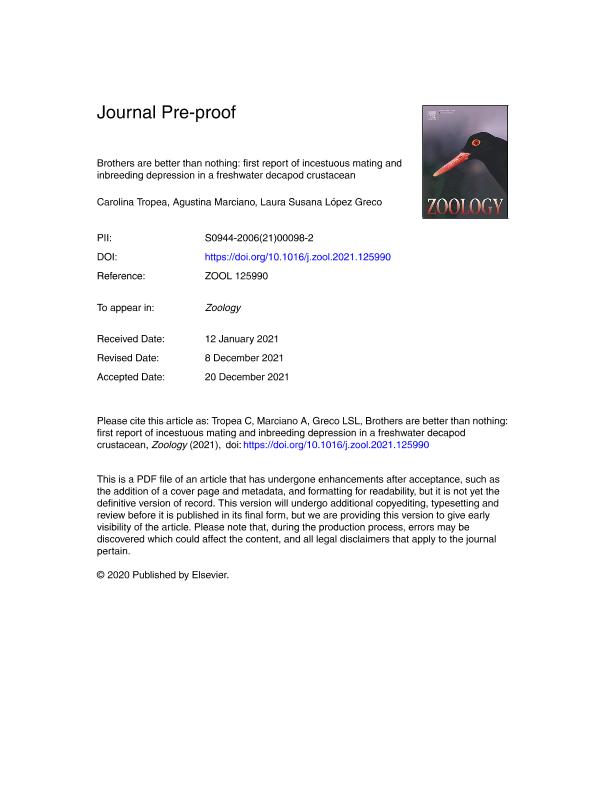Artículo
Brothers are better than nothing: first report of incestuous mating and inbreeding depression in a freshwater decapod crustacean
Fecha de publicación:
04/2022
Editorial:
Elsevier Gmbh
Revista:
Zoology
ISSN:
0944-2006
Idioma:
Inglés
Tipo de recurso:
Artículo publicado
Clasificación temática:
Resumen
This study aimed at evaluating the effect of one generation of full-sibling mating on traits related to the fitness of the gregarious freshwater shrimp Neocaridina davidi, both under optimal and stressful (i.e. starvation) laboratory conditions. Females were maintained either with their brothers (Inbreeding treatment) or non-brothers (Outbreeding treatment), and the first and second broods were used to evaluate egg production and juvenile quality, respectively. The latter was analyzed in a 60-day period following hatching under optimal rearing conditions, and in a 20-day period following hatching under food deprivation conditions. All surviving females from both treatments mated and spawned, indicating that mating with brothers was as likely as mating with non-brothers. With respect to offspring production, inbreeding had no effect on fecundity and fertilization success, but negatively affected the number of hatched juveniles. These results suggest that egg loss was higher in inbred clutches, possibly due to lower embryonic survival. On the other hand, the effect of inbreeding on growth was absent for embryos and for juveniles under optimal rearing conditions, while it was significant for juveniles starved for 10 consecutive days following hatching. Inbreeding depression for survival was only detected in juveniles from stages S8-S9 under optimal rearing conditions. Overall, the present results show that N. davidi fitness decreases after one generation of full-sibling mating. The use of a potentially weak food deprivation protocol and/or the evaluation of only one inbred generation could explain the absence or subtle inbreeding depression for some of the evaluated traits. No evident relationship between life-history traits and the existence and magnitude of inbreeding was found when comparing our results with those previously reported in high-fecundity marine crustaceans and low-fecundity terrestrial crustaceans.
Palabras clave:
CARIDEAN SHRIMPS
,
GROWTH
,
INBREEDING DEPRESSION
,
NUTRITIONAL STRESS
,
SURVIVAL
Archivos asociados
Licencia
Identificadores
Colecciones
Articulos(IBBEA)
Articulos de INSTITUTO DE BIODIVERSIDAD Y BIOLOGIA EXPERIMENTAL Y APLICADA
Articulos de INSTITUTO DE BIODIVERSIDAD Y BIOLOGIA EXPERIMENTAL Y APLICADA
Citación
Tropea, Carolina; Marciano, Agustina; Lopez, Laura Susana; Brothers are better than nothing: first report of incestuous mating and inbreeding depression in a freshwater decapod crustacean; Elsevier Gmbh; Zoology; 151; 4-2022; 1-40
Compartir
Altmétricas




